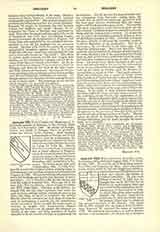

Innocent VII, POPE (COSIMO DE’ MIGLIORATI); b. of humble parents at Sulmona, in the Abruzzi, about 1336; d. November 6, 1406. He studied at Perugia Padua, and finally at Bologna, where he graduated under the famous jurist Lignano. After teaching jurisprudence at Perugia and Padua for some time, he accompanied his former professor, Lignano, to Rome, where he was received into the Curia by Urban VI (1378-89). Shortlyafter his arrival in Rome, Urban sent him as papal collector to England, where he remained about ten years. Upon his return to Rome he became Bishop of Bologna in 1386, and on December 5, 1387, Archbishop of Ravenna. The latter see he held until September 15, 1400. In 1389, Boniface IX created him Cardinal–Priest of Santa Croce in Gerusalemme, and sent him as legate to Lombardy and Tuscany in 1390. He was universally esteemed for his piety and learning, and was an able manager of financial affairs. On October 17, 1404, he was elected and took the name of Innocent VII. His reign fell in the time of the Western Schism; the rival pope was Benedict XIII (1394-1423). Previous to his election, Innocent VII, like the other cardinals, had taken the oath to leave nothing undone, if needs be even to lay down the tiara, in order to terminate the schism. Shortly after his accession he took steps to keep his oath by proclaiming a council, but the disturbances which occurred in Rome brought the pope’s good intentions to naught. The revolutionary element among the Romans rose up against the temporal authority of the pope, and King Ladislaus of Naples hastened to Rome to assist the pope in suppressing the insurrection. For his services the king extorted various concessions from Innocent, among them the promise that he would not make any agreement with the rival pope without stipulating that the king’s rights over Naples should remain intact. Not content with these concessions, which Innocent made for the sake of peace, Ladislaus desired to extend his rule over Rome and the ecclesiastical territory. To attain his end he aided the Ghibelline faction in Rome in their revolutionary attempts in 1405. Innocent had made the great mistake of elevating his unworthy nephew, Ludovico Migliorati, to the cardinalate. This act of nepotism is the one blemish in the short reign of the otherwise virtuous pope. But it cost him dear. The cardinal, angered because the Romans rebelled against his uncle, waylaid a few of the most influential among them on their return from a conference with the pope, and had them brought to his house in order to murder them. The people were highly incensed at this cruel deed, and the pope had to flee for his life, although he was in no way responsible for his nephew’s crime. He took up his abode in Viterbo until the Romans requested him to return in 1406. They again acknowledged his authority, but a squad of troops which King Ladislaus of Naples had sent to the aid of Colonna was still occupying the Castle of Sant’ Angelo and made frequent sorties upon Rome and the neighboring territory. Only after Ladislaus was excommunicated did he yield to the demands of the pope and withdraw his troops. In the midst of these political disturbances Innocent neglected what was then most essential for the well-being of the Church, the suppression of the schism. His rival, Benedict XIII, made it appear that the only obstacle to the termination of the schism was the unwillingness of Innocent VII. The reasons why Innocent did practically nothing for the suppression of the schism were: the troubled state of affairs in Rome, his mistrust in the sincerity of Benedict XIII, and the hostile attitude of King Ladislaus of Naples. Shortly before his death he planned the restoration of the Roman University, but his death brought the movement to a standstill.
MICHAEL OTT

